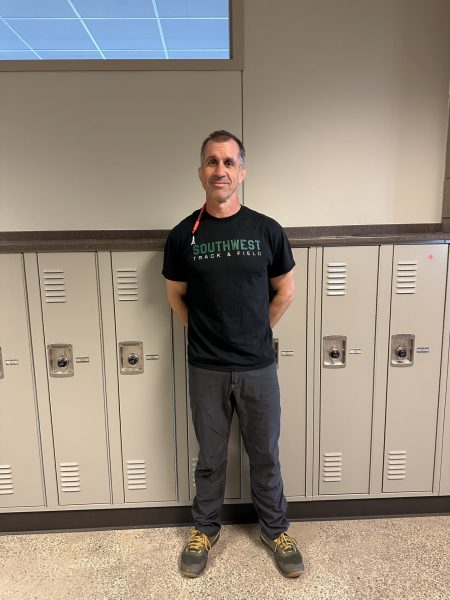Students and staff speak out about the importance of understanding mental disorders
Mental illness: a term plastered all over social media and discussed extensively in the counselor’s office and among teachers. It affects hundreds of thousands of teens —1.8 million to be exact, according to Mental Health America —and yet to some teenagers, it’s a foreign topic. So, what does mental illness look like in high schoolers? And why does it matter?
“It’s hard to say, because there’s varying degrees of what one would consider a mental illness.” Counselor Kelli Baucom said. “There’s a lot of anxiety in kids in high school. Some of it is that healthy anxiety of ‘I want to do well in class, I want to get good grades’ but then some of it goes beyond that to worrying about anything and everything. It becomes overwhelming. You’re so afraid of doing something wrong, or not doing well, that sometimes it gets students in a place where they can’t even begin.”
Junior Katherine Garrett is evidence of this. Garrett said that anxiety was one of the most talked about disorders because it’s “such a common thing”.
“I have always had anxiety. And I’ve sometimes had depression.” Garrett said. “…And also so many of my friends…have suffered from severe depression and anxiety and it’s just hard. So many people have it.”
But why is it so prevalent in kids in high school? Baucom said social media sometimes plays a role in increasing problems with an illness in a student.
““I think today because of so much social media and texting and how available we all are to each other at all times it certainly can perpetuate things.” Baucom said. “You know, when I was a child, I could go home from school and leave school at school. And now it follows you wherever you go.”
In addition, Baucom said places like Instagram and Snapchat paired with “constant contact” with friends can fuel a disorder in different ways, some of which can be harmful.
“It can either feed it in a negative way of ‘I’m always feeling bad about myself and I go to social media to reinforce those negative things’, [or] sometimes it becomes an over reliance on friends for positive things because you can’t get to them yourself.” Baucom said.
Along with social media, school plays a lead role in the reason why mental illness is so prominent in high school students. Garrett said sometimes the amount of homework she has sometimes makes her “have a horrible week or month.”
“It’s from getting a bad test grade that wasn’t exactly your fault. Missing an assignment because you had too much other homework going on that it completely slipped out of your mind.” Garrett said. “Since you put so much pressure on yourself, it can affect you-your mental state-and you can think you’re not as good as what you actually are. I have so much on my plate that there’s not time to do anything else. It’s just school, and the work that comes after school.”
Garrett also said the work she puts into school consumes her to a point where she doesn’t “ have time to do the things you love to do and the things that make you happy.”
Similarly, Baucom said school can have “a negative impact.” While for some it’s a “safe place” away from personal issues, the competitive atmosphere causes mental illness such as anxiety to flare.
“…There is pressure to do well.” Baucom said. “There are some students who don’t feel it, from the teachers, and from us. Some of them really get it from friends.There’s competition among friends for who can have the best GPA, who can have the highest ACT score, and kids take a lot of that on internally. [I have] to talk to kids about ‘You are not a GPA, you are not an ACT score. You are a human being with all kinds of complex characteristics and that the world is going to look at that, not as the score. Let’s try to find a way to get through.’”
So, how can students struggling with a mental illness-whether it seems minor or major-get help and work to recover? Baucom said going to the counselor’s office is the first step.
““We would encourage them to come and talk to us in the counseling office, the four of us” Baucom said. “We want to be able to help.”
In addition, Baucom said that students should reach out to their parents, and that the counselors could aid them in doing so.
“I really encourage kids that are struggling to talk to their parents.” Baucom said. “Even if you’re concerned about what that’s going to look like, or it doesn’t go the way you want it to. You’re welcome to come and talk to us in the counseling office about it. Just say, ‘Hey, I’m really terrified about talking to my parents about this, can you help me through that conversation?’”
Along with this, Baucom said that friends are a good way to get help and can be a support system during an isolating time.
“…Reach out to friends and other students because you often find mental illness has a way of making you think that you’re alone…you will be surprised to find that there are a lot more people dealing with what you’re dealing with than you know.” Baucom said.
In order to create a safe place where students can feel open to tell their peers about a mental illness they might be struggling with, Garrett said that there are some things Southwest students could do.
“…Everyone needs to be aware that people actually, legitimately suffer from these illnesses and it’s not just a joke.” Garrett said. “Just be nice to everyone on a day to day basis and never judge someone, or say cruel things to them, because you never actually know what’s going on inside of them. You could’ve just made their day 10 times worse, and you wouldn’t even know.”
Similarly to Garrett, Baucom said Southwest students should be understanding regarding others around them.
“Being supportive of each other, I think, is really huge. That one person’s victory doesn’t have to be another person’s defeat. That we should want all of us to do well, all of us to sort of lift each other up and celebrate what’s good about each and every one of us that’s here. I think that creates an area of protection.” Baucom said. “I think it’s being understanding…when [you] notice something that doesn’t seem right, say something. We talk about that a lot with mental health; ‘when you see something, say something’.”


















